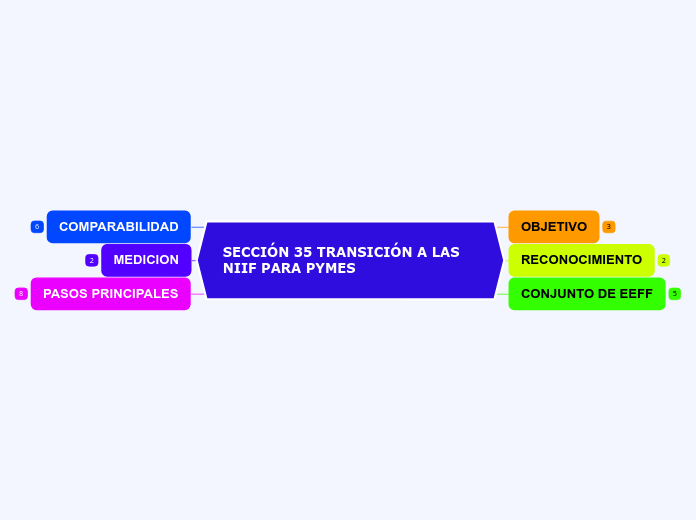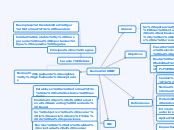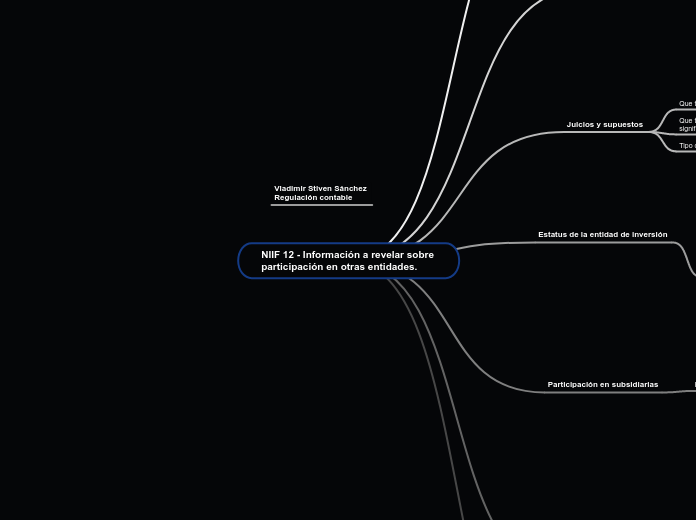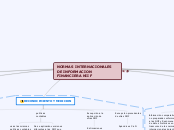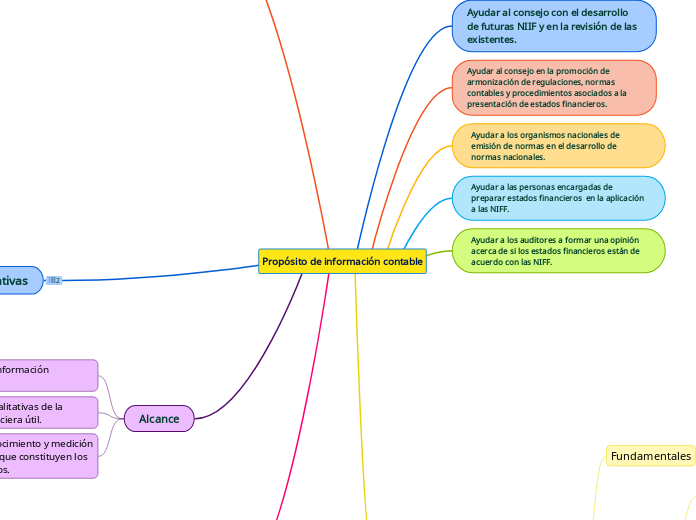SECCIÓN 35 TRANSICIÓN A LAS NIIF PARA PYMES
The part of speech is a category to which a word is assigned according to its syntactic functions. In English the main parts of speech are noun, pronoun, adjective, determiner, verb, adverb, preposition, conjunction, and interjection.
PASOS PRINCIPALES
A conjunction is a word like 'if' 'but' or 'and' which is used to connect sentences or clauses together.
Preparación de
Estados financieros que cumple con la NIIF para pymes
Elaboración de
El estado de situación financiera de apertura
Indicar
Subordinating conjunctions are conjunctions that are used at the beginning of subordinate clauses. Some examples of these conjunctions are: although, after, before, because, how, if, once, since, so that, until, unless, when etc.
La fecha de transición
Determinar
Coordinating conjunctions always connect phrases, words, and clauses. They are: for, and, nor, but, or, yet, so.
Si una entidad adopta por primera vez
MEDICION
A verb is an action word or 'doing' word that signifies movement in some way.
Puede utilizar la revaluación segun PCGA
A linking verb connects the subject with a word that gives information about the subject, such as a condition or relationship.
Puede optar por medir la PPE a su valor razonable
A verb with its own meaning: a verb that is not an auxiliary verb.
COMPARABILIDAD
An adverb is used to describe a verb, but it can also describe an adjective or another adverb.
Adverbs normally help paint a fuller picture by describing how something happens.
Entidades diferentes al mismo tiempo
Dentro de los EEFF de una entidad en el tiempo
UTILES
Cuando la adoptan por primera vez
Cuando ya la aplican
Cuando su información financiera esta conforme a la ley
CONJUNTO DE EEFF
A pronoun is a word that can be used in place of a noun, typically after the noun itself has already been stated.
Notas significativas y explicativas
Reciprocal pronouns are used for actions or feelings that are reciprocated. The reciprocal pronouns are each other and one another.
Un estado de flujos de efectivo
A reflexive pronoun ends with ...self or ...selves and refers to another noun or pronoun in the sentence (usually the subject of the sentence). The reflexive pronouns are myself, yourself, herself, himself, itself, ourselves, yourselves, and themselves.
Un estado de cambios en el patrimonio
Demonstrative pronouns are used to demonstrate (or indicate). This, that, these, and those are all demonstrative pronouns.
Un solo estado de resultado integral, un estado de resultado separado y un estado de resultado integral separado
Possessive pronouns are used to show possession. The possessive pronouns are mine, yours, his, hers, ours, and theirs.
Un estado de situación financiera a la fecha sobre la que se informa
The personal pronouns are I, you, he, she, it, we, they. More often than not (but certainly not always), they replace nouns representing people.
RECONOCIMIENTO
An adjective is a word that's used to describe a specific noun and to provide more detail to the listener.
La baja en cuentas de activos y pasivos antes de la transición no se reconocen
Superlative adjectives demonstrate a higher level of comparison between entities.
Para preparar los estados financieros debe reconocerse todos los activos y pasivos
Expresses a comparison between two entities or groups of entities in quality or degree.
OBJETIVO
A noun is defined as a person, place, thing or idea. Proper nouns always begin with a capital letter. Common nouns, which are general words, such as 'cars,' are not capitalized.
Una entidad solo puede adoptar por primera vez la NIIF para las PYMES en una única ocasión
A noun which refers to a group of things/people.
Proporcionar un punto de partida adecuado para la contabilización de acuerdo con las NIIF
Countable nouns are nouns that can be counted, even if the number might be extraordinarily high.
Uncountable nouns are nouns that come in a state or quantity which is impossible to count; liquids are uncountable, as are things which act
like liquids.
Aplicarse a los estados financieros con propósito de información general de entidades que no tienen obligación pública de rendir cuentas
Proper nouns are the names of specific people or places. They should always begin with a capital letter.
